When Pope Francis arrives in the U.S. for the World Meeting of Families later this month, he will find a Catholic public that is remarkably accepting of a variety of non-traditional families, according to a new Pew Research Center survey that provides an in-depth look at American Catholics’ views on family life, sexuality and Catholic identity.
Nine-in-ten U.S. Catholics say a household headed by a married mother and father is an ideal situation for bringing up children. But the survey shows that large majorities think other kinds of families – those headed by parents who are single, divorced, unmarried or gay – are OK for raising children, too.
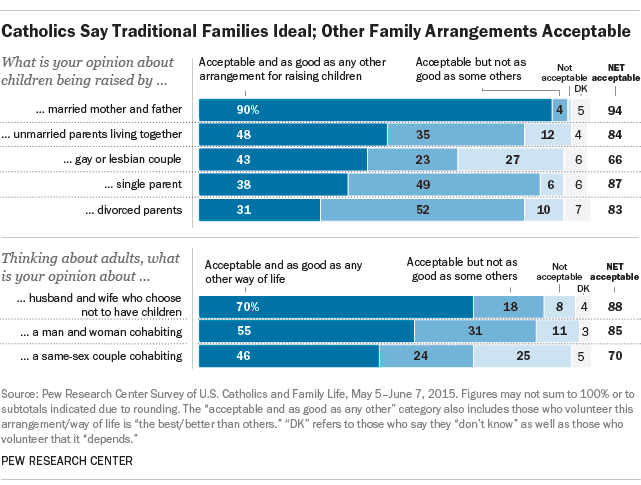
This may be in part because Francis’ American flock is experiencing life in all its modern complexity. According to the survey, one-in-four Catholics have gone through a divorce. One-in-ten have not only divorced but also remarried. One-in-ten are living with a romantic partner, sans wedding, and more than four-in-ten have done so at some point in their lives.
When it comes to matters of sexuality, there are a number of issues on which Catholics either mostly disagree with the church (e.g., on the question of whether Catholics should be permitted to use birth control) or are divided (e.g., on the question of whether the church should recognize the marriages of gay and lesbian couples).
But there also are numerous ways in which Catholics express their dedication to the church and its teachings. For example, seven-in-ten say they cannot ever imagine leaving the Catholic Church, no matter what. Nearly six-in-ten Catholics say abortion is a sin. And more than half say devotion to Mary and receiving the sacraments are “essential” to what being Catholic means to them personally. The survey shows, furthermore, that Catholics who say they attend Mass regularly (at least once a week) are consistently more in agreement with church teachings than are Catholics who attend Mass less frequently.
The survey also shows that the United States is a nation of people whose ties to Catholicism run both deep and broad. Fully 45% of Americans are connected to Catholicism in some way, including one-fifth who claim the faith as their current religion, one-tenth who were raised in the faith and have now fallen away, and a similar share who maintain a cultural connection to Catholicism.
The latter group – “cultural Catholics” – do not identify Catholicism as their religion; most are Protestants or say they have no religion. But they do identify as Catholic or partially Catholic in some other way. This attachment to Catholicism shows up in their lives in various ways: For example, one-third say they attend Mass at least occasionally. And among cultural Catholics who were raised in the church, roughly four-in-ten say they could imagine returning to the faith someday.
The new survey also suggests that Pope Francis may have a difficult time persuading Catholics in the U.S. to adopt his philosophy about excess and his focus on the environment. Though six-in-ten Catholics say working to help the poor and needy is essential to their Catholic identity, only about half as many say the same about working to address climate change. Catholics are divided on the question of whether it is sinful to spend money on luxuries without also giving to the poor, but large majorities say it is not a sin to live in a house larger than needed or to use energy without concern for the impact on the environment. The survey finds that Hispanic Catholics are much more inclined than non-Hispanic whites to express concerns about the morality of excessive consumption.
These are among the key findings of Pew Research Center’s 2015 Survey of U.S. Catholics and Family Life, conducted May 5-June 7, 2015, on landlines and cellphones among a national probability sample of 5,122 adults, including 1,016 self-identified Catholics, with a margin of sampling error of +/- 3.5 percentage points for Catholics and +/- 1.6 percentage points for the full sample. (For more information on the survey’s methodology, see Appendix A.) The survey examines Catholics’ views about a wide range of family issues that Francis and Catholics from around the world may discuss later this month at the World Meeting of Families in Philadelphia and that the church’s hierarchy is expected to continue to discuss at an October Synod of Bishops in Rome.1
The new survey also explores the nature and forms of Catholic identity and connections to the church, and it describes Catholics’ own experiences with divorce, remarriage and cohabitation.
Catholics’ Views on Family Life and Sexuality
Nine-in-ten U.S. Catholics say, when it comes to parenting, a married mother and father are ideal – as good as, or better than, any other arrangement for bringing up kids. But large majorities of Catholics think other family configurations generally are acceptable, too.
For example, 84% of Catholics say it is acceptable for unmarried parents who live together to bring up children, including 48% who call this as good as any other arrangement for raising children. And fully two-thirds of American Catholics think it is acceptable for same-sex couples to raise children, including 43% who say a gay or lesbian couple with children is just as good as any other kind of family.
Leaving children aside, Catholics also condone a variety of adult living arrangements that the church traditionally has frowned upon. A sizable majority (85%) think it is acceptable for a man and woman to live together as a couple outside of marriage, including more than half (55%) who say cohabitation is as good as any other living arrangement for adults. And seven-in-ten Catholics say married couples who opt not to have children have chosen a lifestyle that is as good as any other.
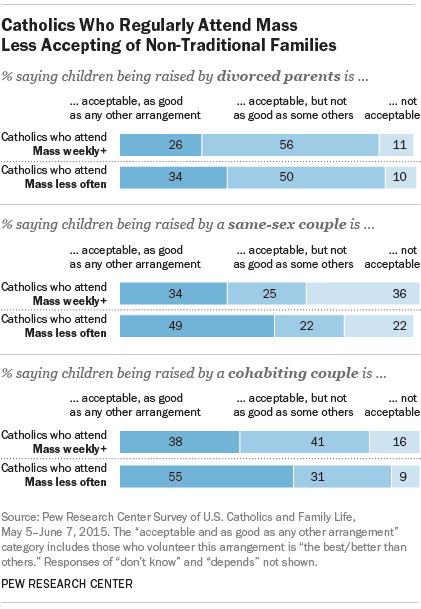 But the survey also shows that Catholics who attend Mass regularly are more inclined to hew to the traditional teachings of the church. For example, among Catholics who say they attend Mass weekly, six-in-ten think that a gay or lesbian couple raising children is either unacceptable (36%) or acceptable but not as good as some other arrangements for raising children (25%); just 34% say a same-sex couple raising children is as good as any other family configuration.
But the survey also shows that Catholics who attend Mass regularly are more inclined to hew to the traditional teachings of the church. For example, among Catholics who say they attend Mass weekly, six-in-ten think that a gay or lesbian couple raising children is either unacceptable (36%) or acceptable but not as good as some other arrangements for raising children (25%); just 34% say a same-sex couple raising children is as good as any other family configuration.
By comparison, roughly half of Catholics who attend Mass less than once a week (49%) say being raised by a same-sex couple is just as good an arrangement for children as any other, and an additional 22% say this is acceptable even if not as good as some other arrangements. Only about one-in-five Catholics who attend Mass less than once a week (22%) say being raised by a same-sex couple is not an acceptable arrangement for children.
(Roughly four-in-ten Catholics say they attend Mass at least once a week. For details, see Chapter 2.)
Overall, Catholics are split on whether homosexual behavior is a sin. More than four-in-ten (44%, including 59% of weekly Mass attenders) say it is, but nearly as many (39%) say it is not. And the preponderance of lay Catholic opinion in the United States today is that living with a romantic partner outside of marriage is not a sin: 54% say it is not a sin, compared with 33% who say it is sinful. Similarly, more U.S. Catholics say getting remarried after a divorce without first obtaining an annulment is not a sin (49%) than say it is a sin (35%), and the same is true on the issue of using contraceptives (66% vs. 17%).
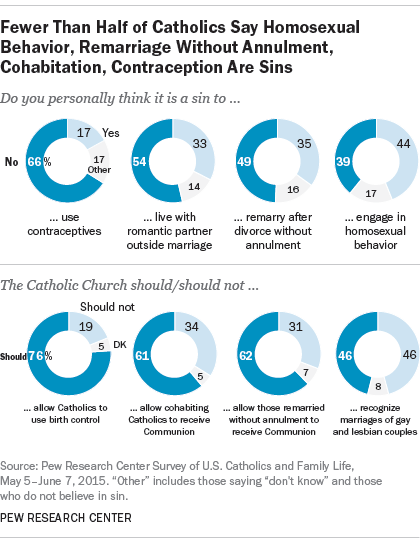 Moreover, many U.S. Catholics would like the Catholic Church, as an institution, to adopt a more flexible or accepting approach toward people who are divorced, cohabiting with a romantic partner outside marriage or in same-sex relationships. Fully six-in-ten say the church should start allowing Catholics who are cohabiting, as well as those who have divorced and remarried without obtaining an annulment, to receive Communion (61% and 62%, respectively). And nearly half of Catholics (46%) think the church should recognize same-sex marriages.
Moreover, many U.S. Catholics would like the Catholic Church, as an institution, to adopt a more flexible or accepting approach toward people who are divorced, cohabiting with a romantic partner outside marriage or in same-sex relationships. Fully six-in-ten say the church should start allowing Catholics who are cohabiting, as well as those who have divorced and remarried without obtaining an annulment, to receive Communion (61% and 62%, respectively). And nearly half of Catholics (46%) think the church should recognize same-sex marriages.
As with attitudes about family arrangements, Catholics who report attending Mass regularly are more likely than other Catholics to accept church teachings about the sinfulness of certain sexual behaviors and living arrangements. For example, most Catholics who attend Mass at least once a week say homosexual behavior is a sin, and nearly half say cohabitation and remarriage after a divorce without an annulment are sinful. Among Catholics who attend Mass less often, fewer view these behaviors and living arrangements as sinful. Regular Mass-attending Catholics are also more likely than other Catholics to say the church should not allow cohabiting Catholics or divorced Catholics who have remarried without obtaining an annulment to receive Communion.
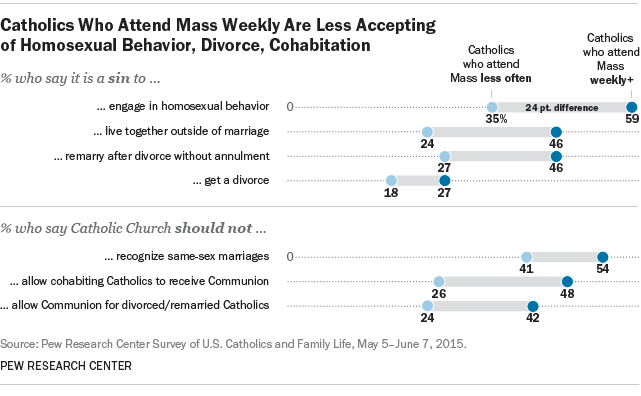
Catholics’ Own Experiences with Divorce, Remarriage and Cohabitation
The new survey finds that a quarter of U.S. Catholic adults have gone through a divorce, including about one-in-ten (9%) who are now remarried. About a quarter of divorced Catholics (26%, or 6% of all Catholic adults) report that they or their former spouse sought an annulment of their previous marriage.2 In addition, 44% of Catholics say they have cohabited with a romantic partner at some point in their lives, including 9% who are currently doing so.
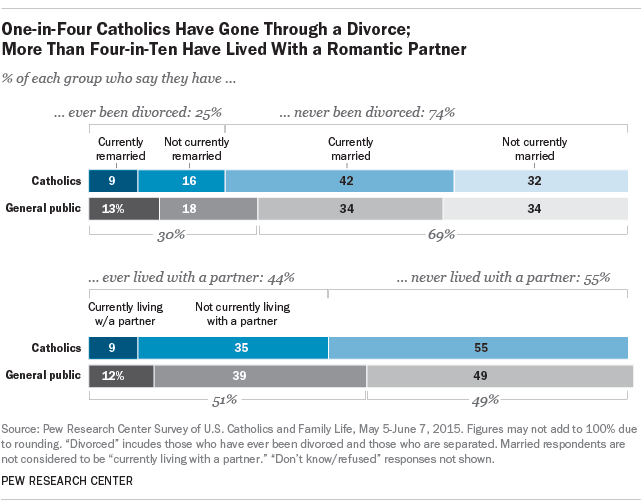
In a separate survey, nearly half of Catholics (47%) said they have a close friend or family member who is gay. And in Pew Research Center’s 2014 U.S. Religious Landscape Study, about 4% of Catholics described their own sexual orientation as gay, lesbian or bisexual.
Catholic Identity and Catholic Connections
Pew Research Center’s 2014 Religious Landscape Study, which asked 35,000 Americans about their religious affiliation, beliefs and practices, found that about one-in-five U.S. adults (21%) identify their current religion as Catholic, down from 24% in a parallel study of the U.S. religious landscape conducted in 2007.
One of the goals of the new survey of U.S. Catholics is to explore a wider range of Catholic identities and connections to the church than previous polls have covered. Indeed, the new survey finds that fully 45% of Americans have some personal connection to Catholicism. For analytical purposes, this report divides them into four main groups:
- Catholics: When asked, “What is your present religion, if any?” one-in-five U.S. adults say they are Catholic. Within this group, there is a wide spectrum of beliefs and practices. Some say they attend Mass at least once a week (39%), while others say they rarely or never go to Mass (16%). But all respondents who say their current religion is Catholic are included as “Catholics” in this report. And, by and large, they are deeply loyal to the Catholic Church. Fully seven-in-ten say they could never imagine leaving Catholicism, no matter what.
- Cultural Catholics: Nearly one-in-ten Americans (9%) say they belong to a faith other than Catholicism (most often Protestantism) or are religiously unaffiliated (atheist, agnostic or “nothing in particular”) but nevertheless consider themselves Catholic or partially Catholic in some other way. The survey asked these respondents to explain, in their own words, why they consider themselves Catholic. They give a variety of reasons, including, most commonly, that they were raised in the Catholic faith and – even though they no longer consider Catholicism to be their religion – they still think of themselves as indelibly Catholic by culture, ancestry, ethnicity or family tradition (for more details, see Chapter 1). Smaller numbers say they were not raised in the Catholic Church but have some other attachment, such as being married to a Catholic, and therefore think of themselves as partially Catholic even though Catholicism is not their own faith. Cultural Catholics generally express an affinity for the church, including high approval ratings of Pope Francis. But they rate much lower than Catholics on measures of Catholic observance (such as attending Mass).
- Ex–Catholics: An additional 9% of Americans say they were raised in the Catholic Church but no longer consider themselves Catholic in any way, either by religion or aside from religion. Not all ex-Catholics appear to be deeply alienated from the church. More than half (59%) give Pope Francis positive ratings, and a few say they go to Mass at least once or twice a year (10%) and would choose to have the sacrament of anointing of the sick – sometimes performed as part of last rites – if they were seriously ill (9%).
- Other connections: About 8% of Americans were not raised Catholic and do not consider themselves Catholic, but nonetheless say they have some familial or institutional connection to the Catholic Church. This group includes people who had a Catholic parent but were not brought up in the faith. It includes some non-Catholics who say they attend Mass at a Catholic church at least a few times a year. It also includes people who have a Catholic spouse or partner but who say they don’t think of themselves, personally, as Catholic or even partially Catholic in any way. (If they did, they would be in the cultural Catholic category.)
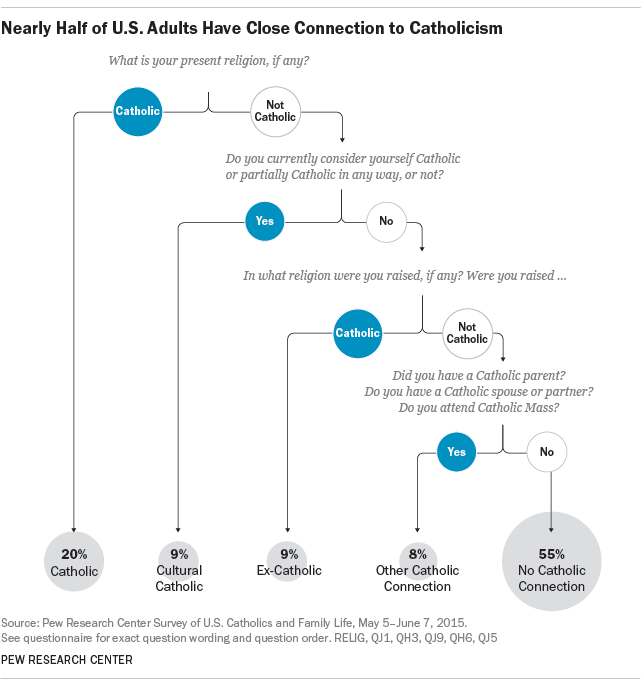
While any attempt to divide nearly half of the U.S. population into a handful of categories is bound to blur some important distinctions, one benefit of this novel categorization is that it highlights the broad reach Catholicism has in American life, extending well beyond the population that currently self-identifies as Catholic by religion. Connections to Catholicism are particularly widespread among Latinos: 84% of Latinos in the current survey are either Catholics (45%), cultural Catholics (13%), ex-Catholics (18%) or otherwise connected to the church (8%).
The categories also make it possible to compare the views and experiences of Catholics not just with the general public, but also with non-Catholics who have varying degrees of exposure to and affinity for Catholicism. With this in mind, many of the charts and tables throughout this report show figures for Catholics as well as for cultural Catholics and ex-Catholics, as appropriate. Respondents with other kinds of connections to Catholicism are discussed less frequently, both because the nature of their connections to Catholicism are quite disparate (some have a Catholic spouse, others a Catholic parent, still others are Catholic-connected in the sense that they attend Mass at least occasionally) and because they were not raised Catholic and do not identify as Catholic today (either by religion or aside from religion).
Leaving, Joining and Staying in the Catholic Church
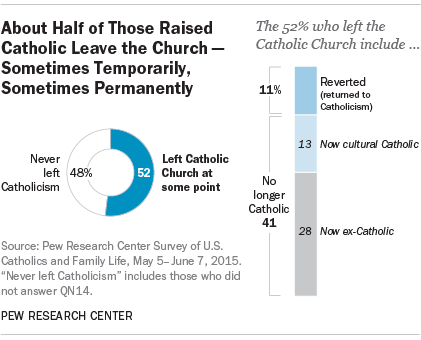 Another feature of the new survey is that Catholics were asked whether there was ever a period in their lives when they left the church. This allows a fuller picture of switching into and out of Catholicism, which turns out to be even more common than previously known.3 The new analysis shows that among all U.S. adults who were raised Catholic, fully half (52%) have left the church at some point in their lives. Of these, about one-in-five (11% of all adults who were raised Catholic) are “reverts” – people who left the church for a while and have since returned. The remainder (41% of everyone who was raised Catholic) have not returned to the faith.
Another feature of the new survey is that Catholics were asked whether there was ever a period in their lives when they left the church. This allows a fuller picture of switching into and out of Catholicism, which turns out to be even more common than previously known.3 The new analysis shows that among all U.S. adults who were raised Catholic, fully half (52%) have left the church at some point in their lives. Of these, about one-in-five (11% of all adults who were raised Catholic) are “reverts” – people who left the church for a while and have since returned. The remainder (41% of everyone who was raised Catholic) have not returned to the faith.
Since Pope Francis’ election in 2013, there has been much discussion of a potential “Francis effect,” with some commentators speculating that the popular pope, and the winds of change he has brought to the church, might draw more former Catholics back into the fold. The survey suggests that the most likely candidates to be drawn back by a Francis effect are in the cultural Catholic category.
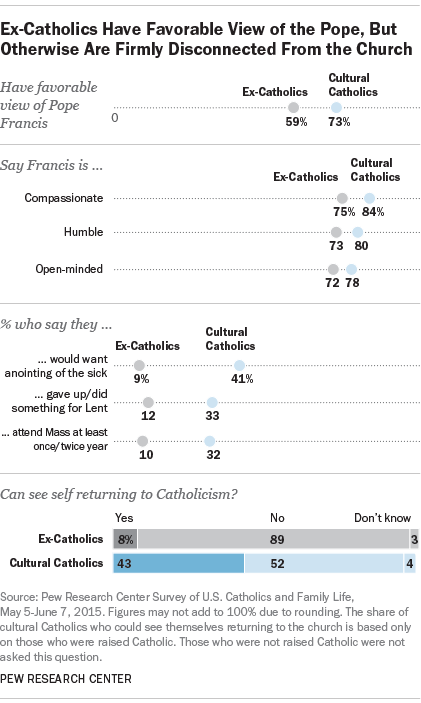 Most cultural Catholics (73%) express a favorable view of Pope Francis, with large majorities describing him as humble, compassionate and open-minded. Moreover, a third or more of cultural Catholics say they observe Lent, go to Mass at least occasionally and would want the sacrament of the anointing of the sick if they were very ill.4 And among cultural Catholics who were raised in the faith, fully 43% say they can see themselves possibly returning to the church someday.
Most cultural Catholics (73%) express a favorable view of Pope Francis, with large majorities describing him as humble, compassionate and open-minded. Moreover, a third or more of cultural Catholics say they observe Lent, go to Mass at least occasionally and would want the sacrament of the anointing of the sick if they were very ill.4 And among cultural Catholics who were raised in the faith, fully 43% say they can see themselves possibly returning to the church someday.
The situation is quite different among ex-Catholics. Although they, too, generally hold the pope in high regard, an overwhelming majority of ex-Catholics (89%) say they cannot imagine themselves ever returning to the church.
(For full results on views toward Pope Francis, see the first release based on this survey, “Catholics Divided Over Global Warming.”)
Care for the Environment and Concern for the Poor
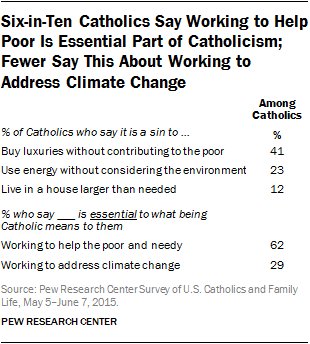 The new survey was conducted shortly before the Vatican released “Laudato Si’,” the pope’s encyclical addressing environmental issues and highlighting the disproportionate impact of climate change on the world’s poor. The survey’s results, therefore, may not reflect the full impact of the encyclical on public opinion. But even before the pope’s highly anticipated message, concern for the poor was very much on the minds of many Catholics. A solid majority (62%) said working to help the poor and needy is essential to what being Catholic means to them, and four-in-ten (41%) said they consider it sinful to buy luxuries without also donating to the poor.
The new survey was conducted shortly before the Vatican released “Laudato Si’,” the pope’s encyclical addressing environmental issues and highlighting the disproportionate impact of climate change on the world’s poor. The survey’s results, therefore, may not reflect the full impact of the encyclical on public opinion. But even before the pope’s highly anticipated message, concern for the poor was very much on the minds of many Catholics. A solid majority (62%) said working to help the poor and needy is essential to what being Catholic means to them, and four-in-ten (41%) said they consider it sinful to buy luxuries without also donating to the poor.
It is less clear whether this concern for the poor affects Catholics’ thinking about the environment in general or climate change in particular. Prior to the publication of the encyclical, just a quarter of U.S. Catholics (23%) said it is a sin to use electricity, gasoline and other forms of energy without concern for their impact on the environment. And three-in-ten Catholics (29%) said that working to address climate change is an essential part of what being Catholic means to them, far fewer than the share who said the same about working to help the poor and needy.
Other Key Findings
Additional highlights in this report include:
- Catholics are divided on the question of whether their Catholic identity is more a matter of religion or ancestry/culture. While 45% say that for them personally, being Catholic is mainly a matter of religion (or of religion and ancestry/culture), 49% say that their Catholic identity is mainly a matter of ancestry or culture (or both). And among those in the “cultural Catholics” category, fully six-in-ten (62%) say that for them, being Catholic is mainly a matter of ancestry and/or culture.
- In terms of what being Catholic means to them, both Catholics by religion and cultural Catholics emphasize the importance of a personal relationship with Jesus, belief in the Resurrection and working to help the poor and needy. But cultural Catholics are less likely than Catholics by religion to place importance on devotion to Mary, receiving the sacraments or being part of a Catholic parish.
- More than half of Catholics (56%) say they sometimes participate in Catholic activities, even if they don’t believe in them, because it is important to their family or friends. Roughly six-in-ten cultural Catholics (63%) and nearly half of ex-Catholics (46%) say this as well.
- Many Catholics, cultural Catholics and ex-Catholics think the Catholic Church should change its position on a variety of issues, including allowing priests to marry and women to be priests, although fewer believe these changes will actually take place in the next few decades.
- Younger Catholics are much more likely than older Catholics to say they could imagine leaving the Catholic Church someday. Four-in-ten (41%) Catholic adults under age 30 say they could see themselves leaving the church, compared with about a quarter (26%) of those ages 30-64 and just 14% of those ages 65 and older.
- A plurality of Catholics say they receive Holy Communion every time they go to Mass (43%), and an additional 13% say they take Communion most of the time. White Catholics are much more likely to say they receive Communion regularly than are Hispanic Catholics. Fully 56% of white Catholics say they take Communion each time they attend Mass, compared with just 21% of Hispanic Catholics. Most Hispanics say they take Communion only some of the time (35%) or that they never receive the sacrament (27%).
- About four-in-ten Catholics (43%) say they go to confession at least once a year, including 7% who report going monthly and 14% who say they go several times a year. Those who attend Mass at least once a week are far more likely than less-frequent church attenders to say they go to confession once a year or more (68% vs. 27%). But, on the whole, there are only modest differences on this question among women and men, younger and older Catholics, whites and Hispanics, and college graduates and those with less education.
- When they pray, about half of Catholics say they rely on memorized prayers such as the Hail Mary (21%) or a combination of memorized prayers and “personal conversations” with God (31%). By comparison, eight-in-ten Protestants (82%), including nine-in-ten white evangelical Protestants (89%), say they rely primarily on personal conversations with God.
- Catholics are as likely as Protestants to believe in the concept of sin, with roughly nine-in-ten in each group professing such a belief. About half of religiously unaffiliated Americans – including 47% of ex-Catholics who now say they are religious “nones” – believe that some actions are offensive to God.
Acknowledgments
Many individuals from Pew Research Center contributed to this report. Alan Cooperman, director of religion research, oversaw the effort and served as the primary editor. Gregory A. Smith, associate director for religion research, and Jessica Hamar Martínez, senior researcher, served as the primary researchers and wrote the Overview and the chapter on exploring Catholic identity. Smith also wrote the chapter on participation in Catholic rites and observances. The chapter on family matters was written by Research Associate Elizabeth Podrebarac Sciupac. Research Associate Becka Alper wrote the chapter on expectations of the church, and Senior Researcher Besheer Mohamed wrote the chapter on beliefs about sin. Copy Editor Aleksandra Sandstrom prepared the glossary, and Research Assistant Claire Gecewicz prepared the detailed tables. The report was number checked by Alper, Gecewicz, Martínez, Mohamed, Sciupac and Smith. The report was edited by Sandra Stencel, Michael Lipka, Caryle Murphy and Sandstrom. Bill Webster created the graphics.
Pew Research Center’s methods team, led by Director of Survey Research Scott Keeter and including Research Methodologists Kyley McGeeney and Andrew Mercer, provided advice on the sampling plan, questionnaire design and data analysis.
Others at Pew Research Center who provided research guidance include Michael Dimock, Claudia Deane, Carroll Doherty, Cary Funk, Ana Gonzalez-Barrera, Jocelyn Kiley, Andrew Kohut and Kim Parker. Communications support was provided by Stefan S. Cornibert, Erin O’Connell and Andrew Cohen. Web support was provided by Stacy Rosenberg and Benjamin Wormald.
Pew Research Center received invaluable advice on the survey questionnaire, analysis of results and writing of this report from a panel of advisers that included: Gary Adler Jr., assistant professor of sociology, The Pennsylvania State University; Tricia C. Bruce, associate professor of sociology, Maryville College; Jesuit Father Allan Figueroa Deck, distinguished scholar in pastoral theology and Latino studies, Loyola Marymount University; Mark M. Gray, senior research associate at the Center for Applied Research in the Apostolate (CARA) and director of CARA Catholic Polls (CCP), Georgetown University; John C. Green, distinguished professor of political science and director of the Ray C. Bliss Institute of Applied Politics, University of Akron; Mary Ellen Konieczny, assistant professor of sociology, University of Notre Dame; Stephen F. Schneck, director of the Institute for Policy Research & Catholic Studies, Catholic University of America; and W. Bradford Wilcox, associate professor of sociology and director of the National Marriage Project, University of Virginia.
Roadmap to the Report
The remainder of this report explores in greater depth many of the key findings summarized in this overview. Chapter 1 offers a detailed look at Catholic identity, including the ways in which cultural Catholics consider themselves Catholic, and documenting the beliefs and practices that Catholics say are essential to what being Catholic means to them. Chapter 2 examines participation in Catholic rites and practices. Chapter 3 explores family matters, describing Catholics’ own living arrangements and marital histories and detailing their attitudes about a number of non-traditional family arrangements. Chapter 4 examines changes Catholics say they would like to see in the church. And Chapter 5 analyzes Catholics’ attitudes about sin.


